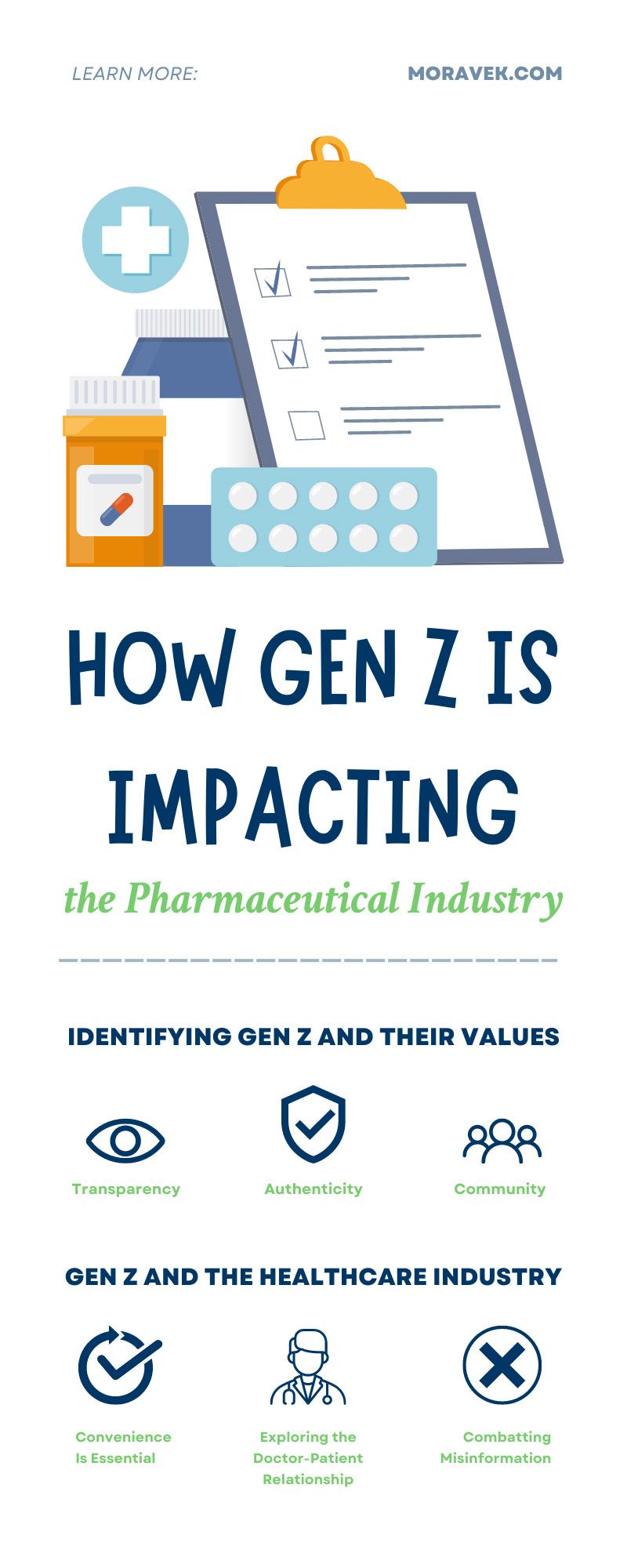
As healthcare evolves, each generation influences trends within the industry. Furthermore, the adaption of technology affects current healthcare approaches. Discover how Gen Z is impacting the pharmaceutical industry and how manufacturers can accommodate their needs.
Identifying Gen Z and Their Values
Gen Z are people born between 1996 and 2010. The digital age, climate shifts, and volatile financial landscape shape the generation and influence their values. They were the first generation to grow up with the internet as a part of daily life, and the widespread knowledge curates their views on different topics. The main values of Gen Z include transparency, authenticity, and community. Here’s a deeper look at the values relating to the generation:
Transparency
Gen Z directs its consumer habits toward brands that align with its values. This generation wants transparent companies that explicitly outline their mission and goals for better societies. Gen Z is aware of social and environmental issues and their global impact. Therefore, they want companies that contribute to social causes.
Sometimes, the generation tends to distrust big brands, believing they only seek monetary advancement. That’s why smaller, more niche pharmaceutical manufacturers are popular with this generation.
Authenticity
Gen Z favors authentic companies with real customers in their advertisements. With the phenomenon of influence marketing, many influencers encourage Gen Z purchase decisions for products, including dietary supplements and medications. However, some niche brands use money to sway influencers on the benefits of supplements. So, they may not depict personal thoughts about some pharmaceutical products.
Community
The internet is a common place for social interactions and knowledge. Gen Z uses social media to engage with each other, start genuine discourse, and learn about the world. They have an ongoing initiative to learn about their healthcare and compare their experiences to others.
Typically, the younger generation discovers supplements through digital ads and short-form content. Users of certain products may post online reviews about supplements and spark discussions. All this to say, Gen Z values their peers’ opinions on pharmaceuticals.
Gen Z and the Healthcare Industry
Every generation has different approaches to healthcare. With Gen Z, access to technology, shifting social factors, and economic statuses influences their outlook on the industry. Here are some trends that affect healthcare and Gen Z interactions:
Convenience Is Essential
The younger generation is likely to use apps for scheduling, viewing medical records, and paying insurance bills. Gen Z is more receptive to telehealth visits than other generations. They also prefer walk-in clinics or urgent care centers, which are more convenient. Essentially, self-service and convenience play major roles in patient and doctor interactions. They look to emails, texts, and apps to manage communication with their doctors.
Exploring the Doctor-Patient Relationship
People refer to Gen Z as “digital natives” as technology was a significant part of their upbringing. Regarding healthcare, younger generations are more likely to web search health questions before speaking to a doctor. In contrast, older generations seek advice from their physician first. This shift changes the dynamic between doctors and patients, as doctors aren’t the immediate source of information. However, some medical professionals bring their expertise online to connect with Gen Z. For example, some doctors have social media pages with medical content. They also integrate telehealth to meet with patients online.
Combatting Misinformation
A known challenge for doctors serving Gen Z is the spread of misinformation. Medical professionals want to ensure that the medical information they receive outside of a doctor’s appointment is accurate.
The frequency of inaccurate medical information online means that patients need a trustworthy source. Especially since Gen Z-ers are likely to seek advice online before their in-person visits. Fortunately, there is a growing trend of collaboration between doctors and patients in their care journey. Doctors provide accurate information and reliable sources for internet searches.
Transforming the Pharmaceutical Industry
The pharmaceutical industry fits the needs of consumer demand. In this case, Gen Z is impacting the pharmaceutical industry by opting for over-the-counter (OTC) drugs rather than prescription ones. Some convenient OTC drugs include topicals, gummies, nasal solutions, gels, and liquid or semi-solids.
It’s important to note that Gen Z prefers a holistic style of healthcare, rather than a general and traditional pharmaceutical approach. This generation is reluctant about traditional healthcare models and would rather customize their wellness plans. For instance, plant-based diets are popular among Gen Z because they offer health benefits like reduced risk of Type 2 diabetes and heart disease.
The generation is aware of how food impacts their health and wellness, so they make conscious decisions to consume healthier options. They care about preventative care just as much as current conditions.
The consumer pharmaceutical industry can focus on distinctive supplements that capture Gen Z’s attention and influence their purchasing power. The industry can focus on effective OTC drugs with natural or plant-based ingredients to support holistic health and self-care. For instance, 3-in-1 vitamins or natural sleep aids can benefit someone’s life.
Shifting Attitudes
Pill fatigue is a rising concern for many consumers, and Gen Z influences trends in the consumer healthcare market. Although traditional tablets and capsules appeal to a pill-based culture, the new generation of consumers wants more choices for their nutritional intake. Simply put, people want to blur the lines between supplements, foods, beverages, and drugs.
Due to increasing pill fatigue, other OTC drugs are popular among consumers. For example, topicals and gummies are two of the strongest categories, and Gen Z prefers both items as self-care solutions.
Pharmaceutical manufacturers should recognize the shift toward OTC drugs and improve the formulas for various supplements.
Opportunities for Pharmaceutical Companies
Gen Z is active regarding their healthcare decisions and won’t wait until a doctor generates a plan. Ultimately, they want a partnership between their healthcare professionals and themselves.
Furthermore, the younger generation values health outside of a traditional healthcare model. Pharmaceutical companies should look at all dimensions of wellness to achieve optimal health. They can create products with multiple benefits and use sustainably sourced, plant-based ingredients for supplements.
Regarding pharma marketing, social media ads and other forms of online marketing can inform Gen Z about supplements. Companies can connect with the group through short-form yet meaningful content like videos or listicle-style blogs. They can also use health influencers to discuss products and their benefits.
Please keep in mind that authenticity is still key with this generation. Products should accurately display their ingredients, intent, and recommended use. It also helps when brands have clear vision and mission statements on how the supplement improves someone’s well-being.
Moravek supports the advancement of healthcare, worldwide medical research, and clinical trials. We offer radiolabeling for pharmaceutical research and other custom services. Start your journey with us today!

